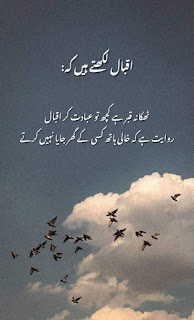Motivational quotes 2
Motivational Urdu Quotes to Ignite Your Passion
Our problem, one of the many that we have, is how to conserve this energy, the energy that is necessary for an explosion to take place in consciousness: an explosion that is not contrived, that is not put together by thought, but an explosion that occurs naturally when this energy is not wasted. Conflict in any form, at any level, at any depth of our being, is a waste of energy.Freedom is the capacity to look at a psychological fact without distortion, and that freedom is at the beginning, not at the end. You must understand that time is a process of evasion and not a fact – except chronological time, which is a fact. But the psychological time that we have introduced – that of gradually bringing about a change in ourselves – has no validity. Because when you are angry, when you are ambitious, when you are envious, you take pleasure in it, you want it; and the idea that you will gradually change has no depth behind it at all. So one removes psychological resistances by observing the fact and not allowing the mind to be caught in unreal, ideational, theoretical issues. When you are confronted with a fact, there is no possibility of resistance; the fact is there.So freedom is to look at a fact without any idea, to look at a fact without thought. Either you look at a fact with words, which is thought, or with conclusions, which again is thought and words, or with knowledge which you have acquired previously, which again is words based on experience – that is, the result of memory conditioning every form of experience. So you have to look at something without thought – which does not mean looking at something blankly, emptily, but looking at it through the understanding of the whole significance of thought.There is freedom when the entire being, the superficial as well as the hidden, is purged of the past. Will is desire; and if there is any action of the will, any effort to be free, to denude oneself, then there can never be freedom, the total purgation of the whole being. When all the many layers of consciousness are quiet, utterly still, only then is there the immeasurable, the bliss that is not of time, the renewal of creation.
Regeneration is only possible in the present, not in the future, not tomorrow. A man who relies on time as a means through which he can gain happiness or realize truth or God is merely deceiving himself; he is living in ignorance and therefore in conflict. A man who sees that time is not the way out of our difficulty and who is therefore free from the false, such a man naturally has the intention to understand; therefore his mind is quiet spontaneously, without compulsion, without practice. When the mind is still, tranquil, not seeking any answer or any solution, neither resisting nor avoiding – it is only then that there can be a regeneration, because then the mind is capable of perceiving what is true;and it is truth that liberates, not your effort to be free. I maintain that truth is a pathless land, and you cannot approach it by any path whatsoever, by any religion, by any sect. That is my point of view, and I adhere to that absolutely and unconditionally. Truth, being limitless, unconditioned, unapproachable by any path whatsoever, cannot be organized; nor should any organization be formed to lead or to coerce people along any particular path. If you first understand that, then you will see how impossible it is to organize a belief. A belief is purely an individual matter, and you cannot and must not organize it. If you do, it becomes dead, crystallized; it becomes a creed, a sect, a religion, to be imposed on others. This is what everyone throughout the world is attempting to do. Truth is
If you see the truth, it will act. If you see the truth that a snake is dangerous, the truth, you act. If you see the danger of a precipice, the fact, the truth of it, you act. If you see the truth of arsenic, the poison, you act. Do you see this, or do you still live in the world of ideas? If you live in the world of ideas, conclusions, then that’s not truth, that’s just a projection of thought.
Effort made to be free without the liberating action of truth is still within the enclosing walls of the self. You can discover truth only if you are willing to give your whole mind and heart to it, not a few moments of your easily spared time. If we are earnest we will find truth; but this earnestness cannot depend on stimulation of any kind. We must give our full and deep attention to the discovery of the truth of our problem, not for a few grudging moments but constantly. It is truth alone that liberates thought from its own enclosing process





Comments
Post a Comment